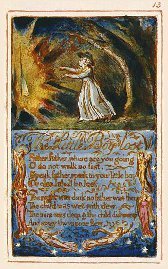Songs of Innocence and Experience Contents
The Little Boy Lost (I) - Synopsis and commentary
Synopsis of The Little Boy Lost (I)

A young boy is out in the country with a father who seems careless of him. He shouts to his father to slow down or else he will be lost. The father goes beyond him in the darkness. The child gets wet with the night's dew. He walks in the deep mud, begins to cry and all light vanishes.
Blake returns to the theme of failure in parental care in a less specific context than in The Chimney Sweeper.
Commentary
The poem speaks of an innocence which involves absolute trust and vulnerability. This vulnerability is underscored by the obvious lack of care and concern on the part of the father. The child's conviction that his father will guide and protect him is not borne out in reality.
In the second stanza, the child is completely alone and unprotected. With the removal of the ‘false' father and then the ‘false light' of the marsh gases, the little boy weeps. He is desolate. However, it is possible that Blake felt the child's ultimate understanding of his isolation was a benefit.
Blake seems to be speaking here of the vulnerability of innocence. An innocence which is ignorant of the ‘woe' in life and of the possibility of failure and betrayal is not praiseworthy, even though we respond to its pathos.
Investigating The little boy lost (I)
- How does Blake present fatherhood here?
Related material
Scan and go

Scan on your mobile for direct link.